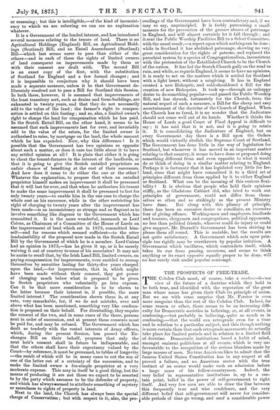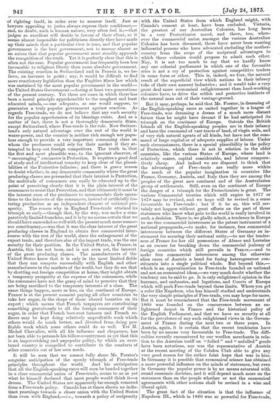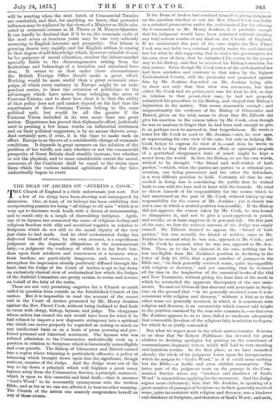THE PROSPECTS OF FREE-TRADE.
THE Cobden Club must, of course, take a couleur-de-rose view of the future of a doctrine which they hold to be both true, and identified with the reputation of the great man whose name has given their Club its principle of union. But we see with some surprise that Mr. Forster is even more sanguine than the rest of the Cobden Club. Indeed, for some reason or other, there seems to be an increasing diffi- culty for Democratic societies in believing, or, at all events, in confessing,—but probably in believing, quite as much as in confessing,—that the world can retrograde even for a time and in relation to a particular subject, and this though nothing is more certain than that such retrograde movements do actually take place for limited periods and in relation to a limited field of doctrine. Democratic institutions breed a habit of mind, amongst eminent politicians at all events, which is very un- favourable to the recognition of the serious blunders made by large masses of men. No true American likes to admit that the famous United States Constitution has in any respect at all proved a failure, and no American orator with the true instinct of an orator would make such an admission before a large mass of his fellow-countrymen. Indeed, the very belief in representative institutions is, up to a cer- tain point, belief in the power of self-government to right itself. And very few men are able to draw the line between this frequently true and wise confidence, and the very different belief that self-government will never for consider- able periods of time go wrong, and need a considerable power
of righting itself, in order ever to recover itself. Just as lawyers appealing to juries always express their confidence,— id, no doubt, such is human nature, very often feel it,—that judges so excellent will decide in favour of their client, so it seems almost impossible for politicians directly they have made up their minds that a particular view is true, and that popular government is the best government, not to assume almost as an axiom that that popular government must steadily approach the recognition of the truth. Yet it is perfectly clear that this is often not the case. Popular government has frequently been less favourable to religious liberty than more absolute government. The existing reaction in Switzerland and in Prussia is, we be- lieve, an instance in point ; nay, it would be difficult to find
more reactionary legislation than the Fugitive Slave law which was sustained by the most popular government in the world—
the United States Government—during at least two generations of the present century. Yet these are cases in which there has been a moral principle apprehensible to the roughest and least educated minds, —one adequate, as one would suppose, to guarantee a truly popular government against reaction. As regards Free-trade, we do not believe that any such security for the popular apprehension of its blessings exists. And as a
matter of fact, there is not a thoroughly democratic State, except Switzerland, where Free-trade is the rule. Now Switzer-
land's only natural advantage over the rest of the world is water-power, and the country is neither rich enough nor popu- lous enough to provide a very important consuming class on whom the producers could rely for their market if they at- tempted to keep out foreign competitors. The truth is, that the first and most plausible way, to the ignorant observer, of " encouraging " commerce is Protection. It requires a good deal of study and of intellectual tenacity to keep clear of the plausi- bilities of the Protective fallacies ; and there is grave reason to doubt whether, in any democratic community where the great producing classes are persuaded that their interest is Protection, the multitude of consumers can easily be educated up to the point of perceiving clearly that it is the plain interest of the consumers to resist that Protection, and that ultimately it must be the interest even of the producers to accommodate their opera- tions to the interests of the consumers, instead of artificially fos- tering production as an independent element of national pro- sperity. The reason why in England Free-trade attained its triumph so early—though that, by the way, was under a com- paratively limited franchise, and it is by no means certain that we should have succeeded so well with the present much more numer- ous constituency,—was that it was the clear interest of the great producing classes in England to obtain free commercial inter- course with the rest of the world, since the enlargement of the export trade, and therefore also of the import trade, was the one security for their position. In the United States, in France, in Austria, this has not been, and is not even yet, the interest of the great producing classes. The manufacturers of the United States know that it is only in the most limited fields that they can compete successfully with English and other manufacturers in the markets of the world, but they do see that by shutting out foreign competition at home, they might obtain a temporary prosperity at the expense of the consumers, while the consumers have not the grasp of mind to perceive that they are being sacrificed to the temporary interests of a class. The same things happen, more or less, on the continent of Europe.
France is at the present moment paying all other countries to take her sugar, in the shape of these absurd bounties on its export ; which means that French taxpayers are contributing something gratuitously to all the foreign consumers of their sugar, in order that French beet-root farmers and French re- finers may be kept doing relatively unprofitable work which others would do much better, and diverted from doing pro- fitable work which none others could do so well. Yet M.
Michel Chevalier, with all his influence and eloquence, has not been able to persuade his fellow-countrymen as yet that this is an impoverishing and unpopular policy, by which an over- taxed country is compelled to contribute to the comforts of other countries out of her own needs.
It will be seen that we cannot fully share Mr. Forster's sanguine anticipation of the speedy triumph of Free-trade principles throughout the world. And his anticipation that all the English-speaking races will soon be banded together in a close commercial union of Free-trade, seems to us as yet what he himself declared that most people would think it—a dream. The United States are apparently far enough removed from a Free-trade policy. Canada has at times shown no indis- tinct yearnings towards a closer union with the United States than even with England,-1.e., towards a policy of reciprocity with the United States from which England might, with Canada's consent at least, have been excluded. Victoria, the greatest of our Australian Colonies, has long been in a very Protectionist mood, and there, too, when- ever the commercial union amongst the various Australian Colonies has been discussed, there have never been wanting influential persons who have advocated excluding the mother- country from the scope of the reciprocal advantages to which these colonies would propose to admit each other. Nay, it is not too much to say that we hardly know any one colonial parliament in which one of the favourite cries is not a cry of protection against competitive traders in some form or other. This is, indeed, we fear, the natural result of the superficial view which nations in their infancy take of their own nascent industries ; and it would take a very great deal more economical enlightenment than hard-working colonists have, to drive the selfish and protective instincts of the natural man out of their vantage-ground.
But it may, perhaps, be said that Mr. Forster, in dreaming of the English-speaking races as united together in a league of Free-trade, was dreaming a dream of a much more distant future than he might have dreamt if he had anticipated its triumph on the continent of Europe. Outside the British Islands all the English-speaking peoples are in their infancy and have the command of vast tracts of land, of virgin soils, and of very rich natural agents of all kinds, but have not the com- mand of large capital or of adequate supplies of labour. Under such circumstances, there is a special plausibility in the policy of Protection, which there is not in relation to the older countries, like the various States of Europe, where land is relatively scarce, capital considerable, and labour compara- tively cheap. And indeed we are disposed to think that the advantages of Free -trade are really more within the reach of the popular imagination in countries like France, Germany, Austria, and Italy than they are among the peoples of the great new continent and of the Australasian group of settlements. Still, even on the continent of Europe the danger of a triumph for the Protectionists is great. The various Commercial treaties which will expire in 1877 or 1878 may be revised, and we hope will be revised in a sense favourable to Free-trade ; but if it be so, this will cer- tainly not happen without great efforts on the part of those statesmen who know what gain to the world is really involved in such a decision. There is, we gladly admit, a tendency in Europe to use free commercial intercourse as the potent instrument of a national propaganda,—to make, for instance, free commercial intercourse between the different States of Germany an in- strument for securing their national unity,—to use the tender- ness of France for her old possessions of Alsace and Lorraine as an excuse for breaking down the commercial jealousy of foreign countries which still prevails in France,—and to make free commercial intercourse among the otherwise alien races of Austria a bond for fusing heterogeneous con- stituents into a single political whole. But beyond this,— which is an approximation to Free-trade founded on national and not on economical ideas,—we very much doubt whether the tendency can be said to go. It is only enlightened opinion in the bureau; and embassies, and legations, and Courts of Europe which will push Free-trade beyond these limits. Where you get a ruler like Napoleon, who has himself studied and understands the very simple principles of Free-trade, you may hope for more. But it must be remembered that the Free-trade movement of 1860 was founded on the concurrence between an en- lightened despot in France and the historical policy of the English Parliament, and that we have no security at all for the prevalence of any such enlightened views in the Govern- ment of France during the next two or three years. In Austria, again, it is certain that the recent tendencies have been by no means very favourable to Free-trade. The diffi- culties recently encountered by our woollen merchants in rela- tion to the Austrian tariff on " fulled " and " unfulled" goods have been notorious, nor was the representative of Austria at the recent meeting of the Cobden Club able to give any very good reason for the rather faint hope that was in him. In Germany it is possible that economical science has obtained a more powerful influence on the minds of statesmen, but even in Germany the popular power is by no means saturated with sound economic doctrine, and it will depend much more on the statesmen than on the people whether or not the economical agreements with other nations shall be revised in a wise said liberal spirit.
The great fact of the situation is that the influence of Napoleon III., which in 1860 was so powerful for Free-trade,
will be wanting when the next batch of Commercial Treaties are concluded, and that, for anything we know, that powerful I influence may be replaced by the views of a Minister as little edu- cated in economic science as M. Thiers or M. Pouyer-Quertier. It can hardly be doubted that if it be so, the economic cycle of the next seven or fourteen years may be one very seriously menacing to English interests and prosperity. Our labour is growing dearer very rapidly, and the English artisan is coming to that degree of self-knowledge which, however valuable it may be for purposes of moral education, renders the labour-market specially liable to the disarrangements arising from the hesitations and balaneings of a tentative and untrained free- dom. It seems to us that under these circumstances the British Foreign Office should make a great effort. Nothing would be more useful than a great economic cam- paign, of which every embassy in Europe might be an inde- pendent centre, to draw the attention of politicians to the advantages which have arisen from enlarging the areas of Customs Unions, and to show how clear it is that the utility of that policy does not and cannot depend on the fact that the constituents of these Customs Unions belong to the same political unit, but would be all the greater if the Customs Union included in its area more than one great nation. Experience has proved that diplomatic effort, judiciouly used in pressing a few home truths on influential statesmen and on their political supporters, is by no means thrown away. And certainly now, if ever, it is the time to make such an effort. Europe is on the eve of a considerable change of economic conditions. It depends in great measure on the solution of the problem of her tariffs, not only whether or not the commercial prosperity of Great Britain shall steadily increase, but whether or not the physical, and to some considerable extent the moral, resources of the Continent shall be equal to the strain upon them which the various national agitations of the day have undoubtedly begun to exert.




































 Previous page
Previous page